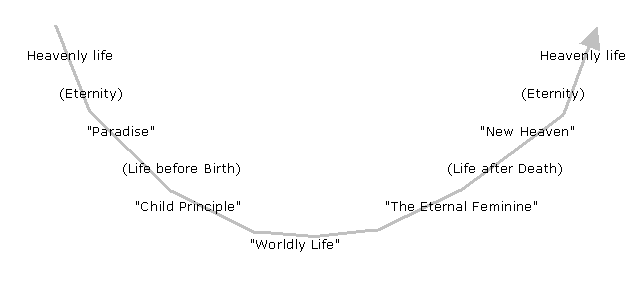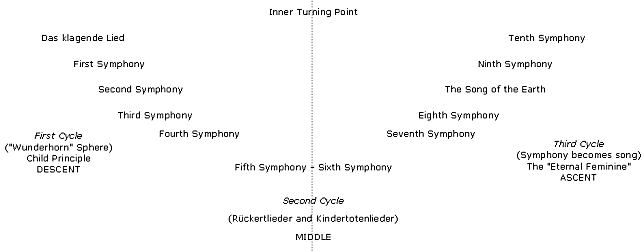
Frank Berger: Mahler's Symphonies
The following interesting and debatable excerpt comes from the following book:
Berger, Frank: Gustav Mahler - Vision und Mythos. Versuch einer geistigen Biographie, Verlag Freies Geistesleben, Stuttgart 1993.
The Symphonies of Gustav Mahler as Polarities of Development
My ... symphonies comprise the content of my whole life ... And if somebody knew how to read well, my life should appear to him transparent indeed ... the parallelism between life and music is maybe far deeper and wider than one is capable of observing now.
Gustav Mahler in the Memories of Natalie Bauer-Lechner, p. 26; letter to Max Marschalk of December 12, 1895, in: Letters of Gustav Mahler p. 141
Looking at the results of our analyses up to now, we recognize an original dualism in
the work and the personality of Gustav Mahler. It is indeed the antagonism between heaven and earth,
between the spiritual, supernatural world and the mortal, sensual world.
From the "worldly life", Mahler always looks longingly towards the "heavenly life". This brings the
eschatological character of his music about. As a mediator between both worlds appear the "Child
Principle" and the principle of the "Eternal Feminine". Both have in common that they draw us up to
that desired sublime state of being. Yet there is a characteristic difference between both principles.
The "Child Principle" appears to be turned backwards accompanied by the yearning for the lost
paradise whereas the "Eternal Feminine" is effective coming from the future in the meaning of the
words: "If he senses you, he will follow."
Between the lost paradise and the "new heaven", there is the "worldly life". That way, the dualism of
the origin is extended to become a polarity - a zone of tension in which the worldly life
appears to be spanned between past and future:

The worldly life appears here to be a state of passage between spiritual forms of being.
Yet there has to be an inner turning point, an orientation towards another direction, otherwise the
principle turned backwards would remain the only one being effective. This turning point lies obviously
somewhere in the middle of this field of force.
Let's now look at Mahler's entire work from this point of view!
We already talked about it (following Mahler's own ideas of periods which in principle Bruno Walter
and Paul Bekker accepted): The first four symphonies are determined by the sphere of the "Wunderhorn"
cycle. The "Child Principle" is effective. - The symphonies in the middle are determined by struggles,
dealings with solid worldly realities. Here the "Salvation" can hardly be seen. The song, as a
representative of the "other world", is mute. Somewhere in this area can yet be found the inner
turning point initiating the turn. It manifests itself in the Kindertotenlieder [...]. - From
the Eighth Symphony onwards, the song, the vocal element, has been achieved again in an increased and
transformed style. The principle of Eternity is present now, not in a resigned form but new,
positive-minded, as the "Eternal Feminine".
To give a scheme, one could say:
The early work (the first cycle of symphonies) is under the influence of childhood, birth, past; the
later symphonies and the Song of the Earth are under the influence of old age, death, future.
Between them are the middle symphonies representing the long middle phase, the "great noon" of life.
The biographical polarity is therefore at the same time a polarity of the
work. Mahler's work is deeply personal and subjective. And yet it goes further than this personal
point of view because every human biography, the life of us all between birth and death, are in
principle subject to the same polarity, yes, under a certain point of view it is its fundamental law.
Therefore it is interesting to confront those two parts of the way, the descending, "incarnating", and
the ascending, "excarnating". So you can recognize the impressing stations of Mahler's life, his
biographical and moral being as well as his artistic and intellectual creation:

At first it may be surprising and even confusing that there should reign such a regularity. We are not used anymore to accept such objective and non-personal characteristics in celebrities' creation. It is therefore the moment to remember that Mahler himself was convinced that his music was not his own merit but inspired and demanded by a sublime necessity: "You are so to speak the instrument on which plays the universe." The artist as an organ of the universal will, as a vocation in its original meaning - such an idea may well appear suspicious to us today. But it is certain - and no polemic can deny it - that Mahler as much as for example Richard Wagner and Arnold Schönberg has recognized and evaluated his historic mission in a realistic way. Therefore you can reverse the usual image and say: Personalities like Mahler or Schönberg are indeed a proof par excellence for the existence of inner regularities in the development of the cultural history and the history of thought.
